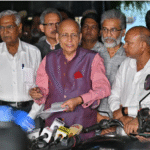Government Warns a significant move highlighting cybersecurity concerns, the Indian government has issued a directive warning its officials against using Artificial Intelligence (AI) tools, citing potential security risks. This decision comes against the backdrop of OpenAI CEO Sam Altman’s visit to India, where he met with Prime Minister Narendra Modi to discuss the future of AI in the country.
The warning underscores the growing apprehension among global governments regarding AI’s potential vulnerabilities, including data privacy, cyber threats, Government Warns and misinformation risks. While AI tools like ChatGPT, Google Gemini, and Microsoft Copilot have become increasingly popular for boosting productivity, their use in sensitive government work raises serious national security concerns.
This article explores the reasons behind the government’s AI restrictions, the potential security threats posed by AI tools, the implications for India’s digital landscape, Government Warns and how India plans to balance AI innovation with security measures.  For the more information click on this link
For the more information click on this link
Why is the Indian Government Restricting AI Use for Officials?
The government’s warning to officials is based on several key security and privacy concerns. While AI has the potential to revolutionize work efficiency, its unchecked use within government offices can expose sensitive data, classified information, Government Warns and national security secrets to external threats.
1. Risk of Data Leaks and Unauthorized Access
AI tools, particularly those operated by foreign tech companies like OpenAI, Google, and Microsoft, require users to input text prompts, queries, and sensitive information. These inputs are often stored and analyzed to improve AI performance.
- If government officials unknowingly enter classified information, it may be processed and stored on servers outside India, raising concerns about data sovereignty.
- AI tools may learn from previous interactions, Government Warns potentially leading to data retention issues even when users believe their queries are deleted.
2. Cybersecurity and Hacking Threats
Governments around the world have expressed concerns that AI-powered tools can be exploited by:
- Hackers and cybercriminals to extract sensitive government data through phishing attacks and AI-assisted social engineering.
- Foreign intelligence agencies that may use AI to collect insights from unintentional government data leaks.
3. Spread of Misinformation and AI Manipulation
Generative AI tools like ChatGPT and Gemini have been known to generate incorrect or misleading information. If used by government officials without proper verification, Government Warns this could:
- Mislead policymakers into making incorrect decisions.
- Spread disinformation through AI-generated fake reports.
- Be exploited by adversarial nations to manipulate government narratives.
4. Lack of Transparency and AI Bias
AI models are trained on large datasets, but their decision-making process is often a “black box”—meaning that even developers cannot fully explain why an AI made a certain decision.
- This lack of transparency makes it difficult for government agencies to fully trust AI-generated insights for policymaking.
- AI models can be biased, leading to unfair or politically skewed recommendations if not properly regulated.
5. International Precedents and Global AI Restrictions
India is not the first country to restrict AI use for government officials. Several nations, including:
- The European Union (EU) – Has strict regulations under the AI Act, Government Warns limiting AI use in high-risk areas like law enforcement and national security.
- The United States – The Pentagon and White House have issued guidelines restricting AI in sensitive intelligence work.
- China – Heavily regulates AI to prevent foreign influence and security breaches.
By issuing a warning against AI tools, the Indian government is following global best practices in cybersecurity and national security protection.
Backdrop: OpenAI CEO Sam Altman’s Visit to India
The government’s directive comes just days after Sam Altman, CEO of OpenAI, Government Warns visited India and met Prime Minister Narendra Modi to discuss AI’s role in India’s development.
Key Takeaways from Altman’s Visit
- AI’s Role in India’s Growth – Altman emphasized that AI can play a transformative role in sectors like healthcare, education, and governance.
- Regulation of AI – He acknowledged the need for government oversight to ensure responsible AI usage.
- Investment in Indian AI Startups – OpenAI has shown interest in supporting India’s AI ecosystem.
Despite Altman’s optimism, the government’s warning indicates that India is cautiously embracing AI while prioritizing security concerns.
Impact of AI Restrictions on Indian Government Operations
The warning against AI tools will have far-reaching consequences for how government officials work.
1. Restricted Use of AI for Official Communications
- Government officials may no longer use AI-powered tools like ChatGPT for drafting emails, reports, or policy documents.
- Sensitive government data will be strictly prohibited from being processed through AI-based platforms.
2. Development of Secure Indian AI Tools
- India may accelerate the development of its own AI tools for government use, ensuring data protection and sovereignty.
- Organizations like C-DAC (Centre for Development of Advanced Computing) and IITs may be tasked with building secure AI models for Indian governance.
3. Impact on Productivity and Bureaucratic Workflows
- AI tools help officials automate repetitive tasks like data entry, analysis, and document drafting.
- Without AI, bureaucratic processes may become slower and more labor-intensive.
- The government may instead opt for secure on-premise AI solutions that do not store data externally.
4. Increased Focus on AI Regulation in India
- This move highlights the urgent need for India’s AI regulatory framework, Government Warns which is still in the early stages.
- Policymakers may draft new AI laws to balance innovation and security.
 For the more information click on this link
For the more information click on this link
Balancing AI Innovation with Security: The Way Forward
While the government has raised legitimate concerns, Government Warns AI remains a crucial technology for India’s digital transformation. Instead of outright banning AI, India must focus on:
1. Developing India’s Own Secure AI Models
- India should invest in homegrown AI models similar to ChatGPT but built with government security in mind.
- Organizations like DRDO, ISRO, and NIC should develop AI solutions for defense, governance, and administration.
2. Implementing AI Guidelines for Government Officials
Instead of a blanket ban, the government can create:
- Clear guidelines on which AI tools can be used and what type of data can be shared.
- Whitelisted AI tools that meet Indian cybersecurity standards.
3. Strengthening AI Data Privacy Laws
- India must fast-track its AI regulatory framework to prevent misuse and security risks.
- The Digital Personal Data Protection Bill (DPDPB 2023) should include specific AI governance policies.
4. AI Training for Government Officials
- Instead of avoiding AI, officials should be trained on responsible AI use.
- Workshops should educate them on AI risks, Government Warns ethical usage, and data protection strategies.
Conclusion: A Necessary Step for AI Security?
The Indian government’s warning against using AI tools reflects a cautious approach towards AI adoption, emphasizing national security and data protection. While Sam Altman’s visit to India underscored AI’s immense potential, the Government Warns directive highlights the challenges AI poses in terms of cybersecurity risks and data privacy.
As India moves forward, the key challenge will be to balance AI-driven innovation with strong security measures. Rather than a complete ban, India must develop secure, Government Warns indigenous AI solutions and implement strict AI regulations that protect both government interests and technological progress.
With the right policies and investments, India can become a global leader in AI while ensuring that national security remains uncompromised. ALSO READ:-Taliban Suspend Afghan Women’s Radio Station Over Overseas TV Broadcasts 2025





